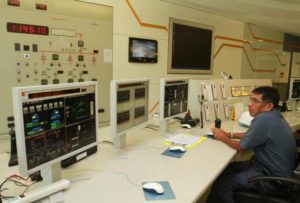
Egat on the ropes
9 July 2018
After nearly half a century in the power industry, the enervated state utility is seeking ways to energise its flagging operations
The Electricity Generating Authority of Thailand (Egat) is showing signs of decline as the 49-year-old wholly owned state utility struggles to tighten costs and reorganise in the wake of market decentralisation and private competition.
The company, which had not reduced staff since being established, now says it is cutting payroll and red tape as it strives to escape the fate of CAT Telecom, another state entity that has seen its bottom line succumb to stiff competition.
THE RAIN COMES
When renewable energy was initially promoted in Thailand during 2006-2007, Egat was reluctant to purchase power back from investors because the tariff was 4-5 times higher than that for fossil fuel-generated electricity.
Officials said developing renewables was expensive and resources were limited.
But energy policymakers granted promotions for over a decade as the technology progressed quickly. In time the number and capacity of investors in the sector grew.
Concurrently, Thailand restructured its power market, shifting from strictly deregulated to partially floating prices to private power producers. The Energy Regulatory Commission (ERC) was set up during this period, bringing more oversight to the sector.
An enhanced single buyer (ESB) model under Egat has long been imposed.

GETTING SICK
The cost of renewables, energy storage and distributed generation (decentralised energy) has been spreading on a global scale, finally reaching Thailand’s shores.
Private power producers, from large to small plants and solar rooftop installations, accounted for 55% of energy generation last year. Egat controlled 32% of power generation in that same year, down from 50% in 2010 and 38% in 2015. Demand for power grew modestly during this period because of an economic slowdown, but private operators accounted for the vast majority of new capacity.
Ageing power plants and low efficiency also drove Egat’s market share down. Businesses further installed their own fossil-fuel-powered generator systems and solar rooftops.
The ERC recently reported that solar rooftops were being received warmly by businesses, as they become cheaper and allow for quicker break-even points.
A National Reform Steering Assembly report on power market reform said power decentralisation is in the works.
THE DIAGNOSIS
The signs of Egat’s decline have been clear over the last two years. Earlier this year, the company issued a report outlining the risks it faces.
The report noted the very high risk of disruptive technology that allows households or businesses to generate power by themselves, and which will ultimately lead to lower demand from large-scale plants.
Energy storage technology is developing rapidly, and will break down one of the most formidable barriers for solar and wind power resources. Storage will be cheaper, more efficient and have a longer life.

An official monitors electricity supply information at Egat’s head office in Bang Kruai.
Egat expects government regulations will make power market decentralisation unavoidable. At present Egat partially monopolises the market thanks to the ESB system. Once decentralisation is implemented it may not be able to compete with private firms. The state utility is overstaffed and in the process of reducing its workforce.
“Several employees have remained in their comfort zones for decades,” said the report.
The company is also unable to recruit new staff or retain existing talent.
Many of Egat’s projects have been delayed, including two coal-fired power plants in Krabi and Songkhla, which will throw the South’s power demand and supply off balance after 2020, potentially leading to brownouts or blackouts.
Last year Egat planned to develop 2,000 megawatts of renewable power from 2018-25. But that plan was rejected earlier this year.
Egat International Co (EGATi) was launched in 2007 to expand the company’s capacity abroad. Although set up as a wholly owned subsidiary, EGATi was intended to work like its private sector counterparts. But in practice the company’s project implementation and processes have been overly bureaucratic.
The report also compares Egat with CAT Telecom, which has faced stiff competition since the market was deregulated in 2013. Concession fees have risen, but the firm managed low margins and efficiency.
The company’s foreign peers, Japan Utility, Tokyo Electric Power Co and Tenaga Nasional Berhad, the Malaysian utility, have successfully handled disruptive technology and are preparing for a restructuring of the market.
Sirichai Mai-ngam, the chairman of Egat’s labour union, said the state utility is positioning itself for fierce competition and disruptive technology. The firm had hoped to list on the Stock Exchange of Thailand in 2005, but that plan was scrapped.
Egat is cutting its staff for the first time in history, in line with PwC’s restructuring plan, which suggested the firm trim its personnel from 21,800 people to 15,000 within five years.
This year, new recruits will not match retiree numbers. Some 1,700 people are expected to retire in both 2018 and 2019, with another 1,400 set to go in 2020.
The number of deputy governors was also reduced from 12 people to seven.
Energy Minister Siri Jirapongphun said the sector will begin its reform plan this year. The plan, he said, emphasises keeping electricity tariffs low so as not to damage national competitiveness.
“One of the major reforms will be in districted power generation, which will give communities the right to generate energy,” said Mr Siri.
Source: https://www.bangkokpost.com/news/special-reports/1500262/egat-on-the-ropes



